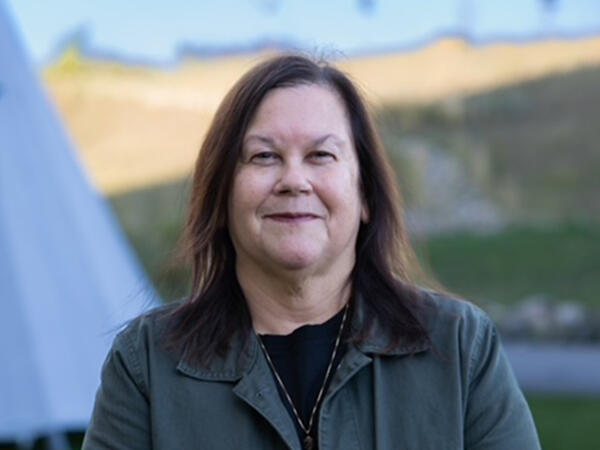Emily Musing, the inaugural Leader-in-Residence at the Leslie Dan Faculty of Pharmacy, reflects on the past year in the role
As Emily Musing’s one-year term as the inaugural Leader-in-Residence at the Leslie Dan Faculty of Pharmacy comes to a close, she says that one of the highlights of the year has been her interactions with students, not only through formal lectures but also through informal discussions and group meetings and a soon-to-launch intensive elective.
“Throughout my interactions with students, I have been impressed by their enthusiasm and interest in leadership. It has re-energized me and reminded me of why I took on leadership roles in my own career,” says Musing, a former vice-president and chief patient safety officer at the University Health Network. “I’ve worked with students at various levels this year, and I’ve found great enthusiasm in this student body. I think that all things are possible for the students as they start their careers, and that’s really exciting.”
The Leslie Dan Faculty of Pharmacy established the Leader in Residence program in collaboration with the Centre for Practice Excellence (CPE) to connect future leaders with established ones to support the continuing evolution of pharmacy and the pharmaceutical sciences and to develop confident, competent leaders who can help guide these fields.
As the first Leader-in-Residence, Musing says that she, along with Zubin Austin, professor and academic director of the CPE, had the opportunity to shape the role. A key focus has been not only to involve students in discussions of leadership, but also ensure that faculty and alumni were included.
"It’s important for us to change the culture of pharmacy and support leadership everywhere and embrace it at all levels."
- Emily Musing
“Historically, pharmacists have tended to take on supportive roles, and they tend to be quite humble and can sometimes be overcautious about leadership roles. So, it’s important for us to change the culture of pharmacy and support leadership everywhere and embrace it at all levels,” says Musing.
As the Leader in Residence, Musing has given guest lectures and presentations in courses, helped judge student competitions such as the business plan competition, and attended student group meetings and informal gatherings to talk about leadership.
“Collegiality across all parts – and generations – of the pharmacy profession is essential for socialization, cohesion, and formation of professional identity,” says Austin. “The Leader in Residence has a unique opportunity to share their networks with the various generations within the faculty, including students, alumni, and faculty. Building these kinds of trans-generational, intra-professional networks is essential for building a strong and resilient profession.”
New leadership intensive elective for PharmD students
One of the signature accomplishments of the Leader in Residence program has been the development of a leadership elective for Doctor of Pharmacy (PharmD) students that will take place at the end of August. The one-week intensive course will connect PharmD students with leaders in a broad range of professions in pharmacy, pharmaceutical industry, professional associations, and government.
Austin says that the course was filled less than a minute after enrolment opened, demonstrating the strong appetite for leadership content in pharmacy education.
“Leveraging her abundant networks with health care leaders across multiple sectors, Emily has developed a course that will be enormously impactful for our students, our faculty, and in the future, our profession,” says Austin.
Musing says that pharmacists, as natural team players, are well-positioned to be strong leaders in health care, and that the pharmacy profession is ready to take on more leadership roles.
“We’re used to working and collaborating with people, and I think that’s what leadership truly is about. A true leader is a person who can see something that needs to be done and rally people around an issue, so that people are excited about it,” she says.
“People in the profession are excited about how U of T is being active and thoughtful in creating an environment and culture of leadership for pharmacists and watching what we do. The work we are doing now can make an impact in how leadership is embedded into pharmacy education across Canada.”
More News
Image

Research team aims to co-design diabetes and dementia support programs that meet community needs
Network for Health Populations funding will support collaborative project to improve health outcomes for immigrant communities in Mississauga.
Read More
Image

Pharmaceutical industry resident finds growth in new challenges
Pharmaceutical Industry Residency Program Award recipient AnnaMaria Passas gained new skills through residency and research project to improve marketability in industry.
Read More
Image

Pharmacy alum sees change in acceptance of Indigenous cultures in health care
During Deborah Emery’s 40-year pharmacy career, she provided care in Sioux Lookout, Thunder Bay and Manitoulin Island.
Read More
